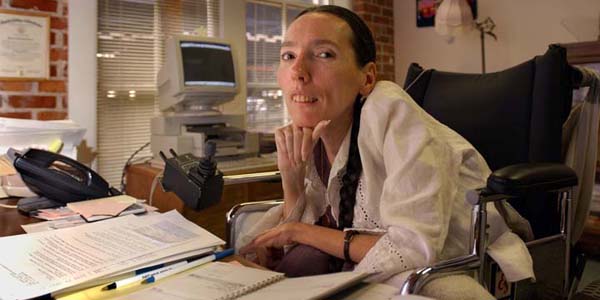On the Passing of Harriett McBryde Johnson
Category : Disability Theology , Secular Views on Disability
 There are so many things we can learn from Harriett McBryde Johnson, who died earlier this month at the age of 50 from a congenital neuro-muscular disease. Surely, she was a champion for the rights of those with disabilities, but she was much more than that. Here is a sampling of the truths we can learn from her, all from the Wall Street Journal article:
There are so many things we can learn from Harriett McBryde Johnson, who died earlier this month at the age of 50 from a congenital neuro-muscular disease. Surely, she was a champion for the rights of those with disabilities, but she was much more than that. Here is a sampling of the truths we can learn from her, all from the Wall Street Journal article:
- She challenged philosopher Peter Singer by saying “The presence or absence of a disability doesn’t predict quality of life.”
- She worked with groups like “Jerry’s Orphans” who challenge the Labor Day telethon, and she also worked with Not Dead Yet, a disability-rights group formed to challenge the assisted suicide movement.
- Her work has encouraged our society to question “the rapid near-disappearance of people with Down Syndrome. Between 80% and 90% of women who find out they are carrying a child with the chromosomal abnormality (which can be tested using amniocentesis) choose to abort. A Harvard medical student who surveyed 1,000 women who were pregnant with Down Syndrome babies reported that many were urged by their doctors to terminate their pregnancies; one woman’s physician told her that her child would “never be able to read, write or count change.” This at a time when new developments in medicine have nearly doubled the average life span of people who have the condition to 49 from 25 years. As a culture, we have made what Amy Laura Hall of Duke University Divinity School calls a “democratic calculus of worth” regarding Down Syndrome. And that calculus has resulted in a society hostile to people who refuse to make the culturally acceptable choice of ridding themselves of a disabled child before she is born.”
Yes, we can learn much. But as with all truth, and she definitely had latched into a truth, it comes from God and belongs to God. A society that values people with disabilities does so for reasons other than the fact that they can ‘enjoy happy, productive, and fulfilled lives.’ This is true whether you believe in God or not.
But for people who believe that God did create people in His image, it is easy to understand why people with disabilities are important: because they, like us, reflect His image. They, like us, are conceived with an intrinsic value – not because of their disability, but because God is glorified in, through, and around their lives.
